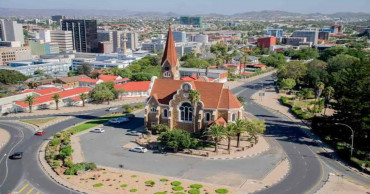national development
Gap between local realities and national development narrative widening: Citizen’s Platform
Citizen’s Platform for SDGs, Bangladesh on Thursday said the local-level development is affected by poor institutional effectiveness as the efficacy of public institutions has gradually eroded in the country.
“Capacity of public institutions to service the disadvantaged groups, profile and prestige of local leadership have diminished overtime. Citizens’ voice has weakened too.” said Citizen's Platform Convenor Dr Debapriya Bhattacharya.
Read more: Economic mismanagement creating instability in market: Debapriya
He was addressing a media briefing in the city’s BRAC Centre Inn to share local opinions received from a series of sub-regional consultation meetings.
The Citizen’s Platform arranged the seven consultation meetings between June and October this year to understand how much the local realities reflect the national development narrative. More than 500 engaged citizens from 25 districts of Bangladesh participated in the meetings and expressed their views and opinions.
Dr Debapriya said that citizen’s voices, role of CSOs and NGOs and civic activism of students suppressed by a “culture of fear” that has intensified in the recent past.
Middle class on the retreat
He said that local situations reveal that the leadership role of the middle class is retreating in setting social norms and inclusive cultural approach in society. “Their socio-cultural role has been squeezed. The middle class is also under pressure due to lack of employment, high inflation and decline of income,” he added.
He said that the disjunction has widened between national development narrative and local experience as there is uneven distribution of the development gains due to discriminatory design, weak delivery and limited access to resources and public services.
Dr Debapriya said that, according to the consultation participants, the impact of ongoing inflationary pressure has fallen disproportionately on the marginalised groups and people with low income. “Traditionally ‘left behind’ groups are not being able to reach national averages,” he said.
Read more: Economy needs transitional policy to overcome the crisis: Debapriya
The gap between national development narrative and local realities, and asymmetries were aggravated further by lack of democratic accountability, he added.
Focusing further on local realities, he said the rich tradition of cultural activities gradually receding; social fabric weakened as values of tolerance, trust and compassion withering away; and political space for pluralistic views, conversation and engagement narrowing.
“There is rising concern among the district-level citizens that the smooth developmental progression of Bangladesh may get jeopardised due to adverse national and global economic outlook, as well as because of the apprehended political violence during the upcoming democratic transition,” said Dr Debapriya.
3 years ago
PM Hasina urges public servants to work for people's welfare
Prime Minister Sheikh Hasina on Monday asked the public servants to carry out their utmost responsibility of serving the people to ensure they enjoy the benefits of national development.
“You have to be the servants of the people and human beings. Serving people is the biggest matter. All of you have to work as per that direction,” she said.
The prime minister said this while addressing a programme to distribute course certificates and course completion of the 73rd foundation training course at Bangladesh Public Administration Training Center (BOATC) in savar.
She joined the programme virtually from her official residence Ganabhaban.
She said that it is the responsibility of all to ensure the welfare of the people of this country.
“This is our country. It is the responsibility of us to ensure the welfare of the mass people. This has to be kept in mind all the time,” she said.
She asked the newly appointed government officials to devote themselves to the welfare of the people and development of the country.
“If the people at grassroots level stay fine, then the economic development of the country becomes inevitable. No one can stop that,” she said.
PM Hasina also asked the newly appointed public servants to utilise their intelligence and creativity for ensuring country's sustainable development.
"A special focus should be given to ensure country's sustainable development," she said.
She hoped that the recruits will be the soldiers in attaining the government's target to turn the country into a developed one by 2041.
"I am giving the plans to make Bangladesh a developed and prosperous country and you have to implement those," she told the young officials.
Read: PM Hasina: Govt devising ways to bring down prices of essentials
3 years ago
PM calls for best use of domestic resources for national development
Prime Minister Sheikh Hasina on Sunday asked the government officials to ensure optimum utilisation of domestic resources to help achieve Bangladesh’s goal to become a developed country.
"Whatever resources the country has, we have to utilise those to advance the country. Inshallah, the forward march of Bangladesh will continue," she told a function marking the signing of the Annual Performance Agreement (APA) of ministries and their subordinate bodies.
The programme was held at the Osmani Memorial Auditorium with the PM joining it from her official residence Ganobhaban.
Read: PM calls Padma Bridge a milestone to change the fate of people: PM
Liberation War Affairs Minister AKM Mozammel Huq, State Minister for Public Administration Farhad Hossain and Cabinet Secretary Khandker Anwarul Islam were present on the dais at the programme at Osmani Memorial Auditorium side.
PM Hasina said that the construction Padma Bridge with own resources has brightened Bangladesh’s image abroad and earned respect for the people. Banglalees will now move around the world with their heads held high, she said.
She mentioned that vested quarters made lives of her family members, the then-communication minister, an advisor and the then-secretary miserable levelling false allegation against them.
She once again said, “I knew that there was no corruption happened in Padma Bridge project. I had that belief. At one stage I declared to construct the Bridge with own financing.”
She recalled that many in the country and abroad could not believe that Bangladesh would be able to construct the Bridge with its own resources.
"Today we have done that, this is not only a brick-cement-steel-iron made concrete infrastructure, this is the symbol of our self-dignity," she reiterated.
This Padma Bridge she said, is the symbol of “our victory and honour as we the Bangalee nation are the victorious nation that got Independence through the Liberation War.”
"We have to move with confidence that yes we can. Not only the developed countries can do, we also can do. Inshallah, we will be able to establish ourselves as the developed country and that is our belief."
She said that her government has been able to realize most of what Father of the Nation Bangabandhu Sheikh Mujibur Rahman dreamt in a building “Sonar Bangla”, a nation of happiness and prosperity.
She said that huge non-perishable goods from the southern region will now be transported through the Padma Bridge uplifting the region.
She asked the officials to accelerate the development of wholesale markets at Amin Bazar, Mohakhali, Sayeedabad/Kanchpur and Postogola/Keramiganj for the better management of these goods.
Read: Cost very reasonable, no scope for corruption: PM on Padma Bridge project
"We have to build those to reduce the pressure at Karwan Bazar area," she said.
She also put emphasis on building ring road around the capital city for smooth traffic and transportation of commodities.
Talking about flood, the prime minister said the people will have to live with it as Bangladesh is a flood-prone country.
"All our planning is to save lives of the people," she said.
She again urged all to maintain safety measures to protect themselves from Covid-19 infections.
The PM said the government would implement her party Awami League’s electoral pledges and thus uplift the people’s living standard.
“We want to implement the electoral pledges through which we assumed power,” she said.
She said the government has transformed Bangladesh into a developing country in 2021 while the nation celebrated twin mega events, the birth centenary of Bangabandhu and 50 years of the country’s independence, in accordance with the Awami League’s election manifesto of 2008.
She said her government has now been working tirelessly to ensure a better life for the people by making Bangladesh into a developed country, free from poverty and hunger by 2041.
"The government has been implementing a perspective plan for 2021-2041 to pursue the target," she added.
Earlier, senior secretaries and secretaries in charge of various ministries and divisions handed over a copy of their respective APA to the prime minister.
The cabinet secretary, on behalf of the prime minister, signed the APA.
Liberation War Affairs Minister AKM Mozammel Huq received the APA on behalf of the prime minister.
Under the agreement, the ministries will set their visions, missions and strategic goals in line with the development priorities of the government, take short- and long-term plans as per budgetary allocations.
The government introduced the method of the APA in the 2014-2015 fiscal year for the public sector to ensure institutional transparency, accountability, proper utilisation of resources and, above all, enhancing the institutional efficiencies.
The main objectives of introducing APA are moving the focus of the ministry from process-orientation to result-orientation, and providing an objective and fair basis to evaluate the overall performance of the ministries and divisions at the end of the year.
The APA is an internal mechanism of the civil administration from top to the grassroots level to ensure accountability of the government officials aimed at evaluating their yearly performances and making them accountable to their responsibilities.
The government has signed the APA with the ministries and their subordinate bodies which also included divisional, district and upazila-level offices of the government.
Mozammel Huq, on behalf of the PM, handed over the APA and national integrity service awards among the winners.
3 years ago
Suspension, legal action if involved in irregularities: LGRD Minister
Anyone responsible for substandard work in projects taken for national development will either be suspended or face legal action, Local Government, Rural Development and Cooperatives Minister Md Tajul Islam said on Sunday.
He said this while addressing an online meeting at his office to review the progress of implementation of projects included in the Revised Annual Development Programme (RADP) for the fiscal year 2019-20 under various divisions and departments of the ministry.
Minister Tajul also instructed the project directors and all concerned to complete all current projects within the stipulated time.
Laying emphasis on standard, sustainable and productive works of development projects and completing the work within the given time, the minister warned that officials and employees who will be involved in substandard work will face stern actions.
Tajul said that there will be also reward for good works as well as punishment for malicious deeds.
He also added the state is committed to providing security to project directors and engineers if they face any obstacles or threats to ensure quality of project work.
5 years ago
Namibia develops lifelong learning policy to drive national development
The Namibian government is developing a national lifelong learning policy, as it seeks to synchronize the country's societal interests and continuous learning needs, a government official said Monday.
6 years ago



.jpg)


